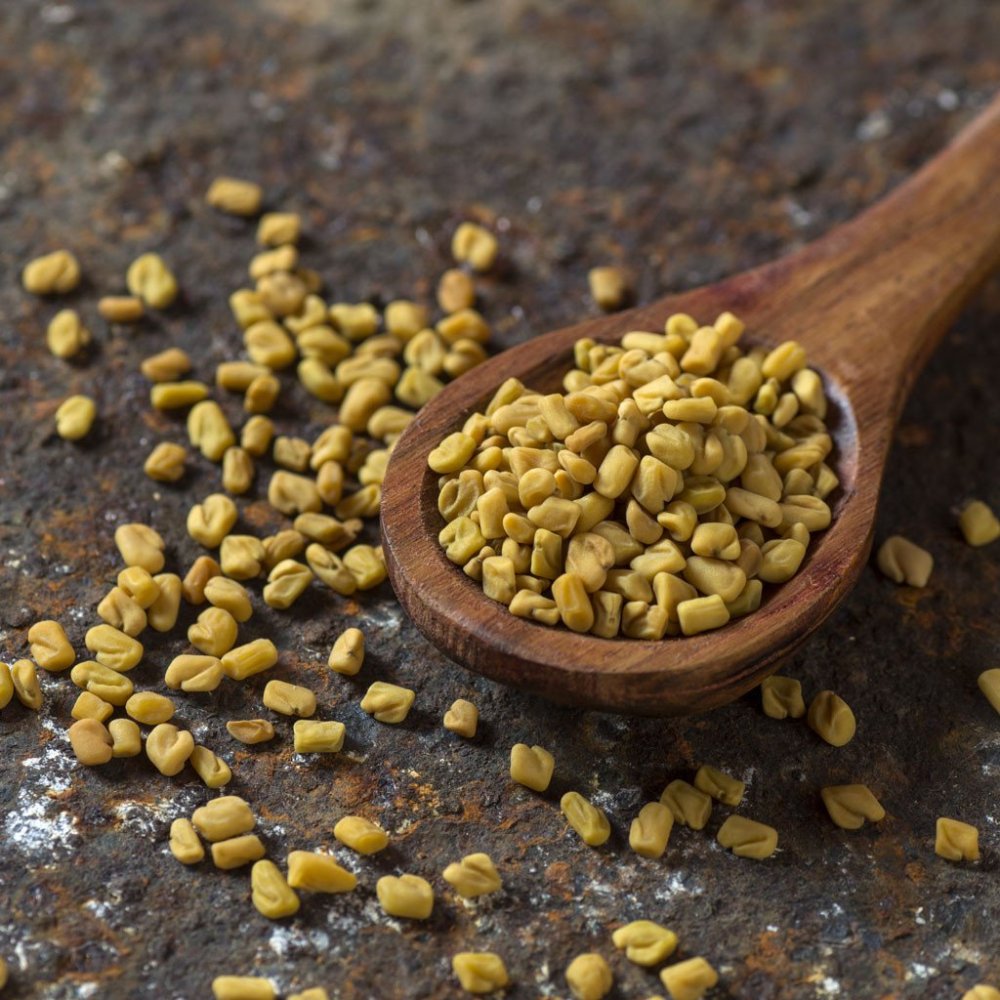FENUGREEK!

Wondering what is Fenugreek? It’s called Methi in Hindi and Vendhayam in Tamil. For thousands of years, fenugreek has been used as an alternative Chinese medicine to treat skin conditions and many other diseases. This article aims at convincing you that fenugreek holds the power to transform your overall health.
Fenugreek seeds and leaves are strongly aromatic and flavorful. Seeds are bitter in taste but lose their bitterness if roasted slightly. They are rich in vitamins such as thiamine, folic acid, riboflavin, niacin, vitamins A, B6, and C and are a storehouse of minerals such as copper, potassium, calcium, iron, selenium, zinc, manganese, and magnesium. Fenugreek leaves are a rich source of vitamin K as well.
Although you wouldn’t consume fenugreek in large amounts, one tablespoon of whole seeds contains 35 calories and several nutrients:
- Fiber: 3 grams.
- Protein: 3 grams.
- Carbs:6 grams.
- Fat: 1 gram.
- Iron: 20% of your daily requirements.
- Manganese: 7% of your daily requirements.
- Magnesium: 5% of your daily requirements.
Suggested Dosage
Seed:
- 1-2 g orally three times daily
- No more than: 6 g/day
Tea:
For diabetes: 5-100 grams of powdered fenugreek seeds added to one or two meals daily for 4 days to 3 years can be used. A dose of 1 gram daily of an extract of fenugreek seeds can be used.
For painful menstruation (dysmenorrhea): 1800 – 2700 mg of fenugreek seed powder for about three times everyday for the first 3 days of menstruation, followed by 900 mg three times daily for the remaining two menstrual cycles can been used.
Balances cholesterol levels and treats diabetes: A high level of cholesterol in the blood stream makes you more vulnerable to blood clots, heart attack and strokes.
Fenugreek is packed with fiber, which helps reduce the excess cholesterol in the arteries and blood vessels. It also benefits those who have type II diabetes, thanks to the presence of fiber galactomannan.
It reduces the rate at which sugar is absorbed in the blood stream. A specific amino acid in fenugreek can regulate the insulin release, this way the overall functioning of the body is improved significantly.
Reduces inflammation: The powerful antioxidants and anti-inflammatory properties of fenugreek mucilage is proved to be able to fight inflammation both inside and outside the body as well.
Used externally, fenugreek is effective in treating wounds, gout, pain and swelling of the muscles, dandruff, etc. At the same time, it is an active ingredient to treat arthritis and prevent further inflammation caused by arthritis.
Aids milk production in lactating women: It has long been trusted to improve milk production of feeding mothers due to a specific content called diosgenin. Rich in magnesium and vitamins, fenugreek also increases the quality of the milk produced, thus keeping your child healthy.

Improves digestive system: Fenugreek comes in handy for people who are suffering from digestion-related ailments such as indigestion, gastritis, constipation, stomach inflammation or irritable bowel syndrome. High concentration of fiber and anti-inflammatory properties make it a common remedy to treat digestion and improve the overall health of digestive systems.
Improves exercise’s performance: A study carried out by Journal of Sports Science and Medicine reported remarkable result of combining creatine and fenugreek extract in increasing body composition, muscular strength and endurance. So if you are an athlete or simply involving in physical exercises, remember to take fenugreek extract with creatine supplement, you will see the improvements in your body and your performance in no time.
Helps you to lose weight: Include fenugreek in our weight loss diet by chewing soaked seeds in the morning on an empty stomach. The natural soluble fibre in the fenugreek can swell and fill the stomach thereby suppressing our appetite and aiding in weight loss goals.
Reduces Menstrual discomfort: Fenugreek contains compounds like diosgenin and iso-flavones with estrogen-like properties which helps reduce symptoms like discomfort and menstrual cramps associated with PMS. These compounds also ease menopausal symptoms like hot flashes and mood fluctuations. Women are more prone to iron deficiency during adolescence (initiation of menstrual periods), during pregnancy and breastfeeding. Therefore including green leafy veggies like fenugreek in their diet can supply a good amount of iron. But, make sure to add tomatoes or potatoes to the preparations to enhance the iron absorption.
Treats skin problems: Fenugreek can be used in face packs to help prevent blackheads, pimples, wrinkles, etc. Washing your face with water boiled with fenugreek seeds or applying a paste of fresh fenugreek leaves for twenty minutes on your face can work wonders for your skin.
Resolve hair problems: Using fenugreek as a part of your diet or as a paste to directly apply on your hair makes your hair shiny and black. Massaging your head everyday with boiled fenugreek seeds soaked overnight in coconut oil can be an excellent remedy for thinning of hair and hair fall.
We should also note that having fenugreek has some side effects when taken more amounts than the normal dosage.
Side effects include:
- Allergic reaction
- Asthma
- Diarrhea
- Gas (flatulence)
- Low blood sugar (hypoglycemia)
- Wheezing
So consume fenugreek according to the dosage and enjoy its benefits! 🙂
Regards,
Harini. N. B, M.Sc(Clinical Nutrition), RD., Certified Diabetes Educator!
Images Courtesy: Google!
©www.epomesoruthan.com